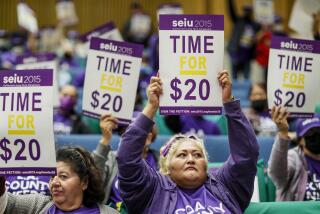AFL-CIO Seeks Steep Increase in Jobless Benefits
- Share via
MIAMI BEACH, Fla. — The leaders of organized labor on Monday urged Congress to sharply expand unemployment benefits during the recession and to create permanent federal standards that would regulate how states determine eligibility for jobless benefits.
Members of the AFL-CIO’s executive council, beginning their annual winter meeting, adopted a series of “anti-recession” recommendations calling on Congress to spend unspecified billions of dollars on expanded jobless benefits, highway construction, mass transit and low-cost housing.
In his State of the Union address last month, President Bush vowed to veto any anti-recession bill from Congress, contending that the recession will be of a short duration.
But AFL-CIO President Lane Kirkland told reporters that regardless of how long the recession lasts, “the economic consequences will be long. . . . Every recession has a residue of high unemployment that has taken years to overcome.”
The executive council, made up of the heads of the nation’s three-dozen largest unions, said in a written statement that “the crisis of unemployment and the need for long-term economic recovery is equally urgent” as the Persian Gulf War and the bailout of the savings and loan industry.
Only about 37% of the unemployed were receiving unemployment benefits in 1990. This was a sharp decline from the 43% of unemployed who received benefits in the recession year of 1982 and the 63% who received them in the recession year of 1975, according to the Bureau of Labor Statistics.
The decline in coverage has occurred because many states have tightened eligibility requirements and because the more transitional nature of the economy has created more ineligible workers, experts say.
California falls below the national average in benefits. Only 28% of the unemployed people eligible for benefits in California now collect them, compared to 37% nationwide. The average weekly unemployment benefit in California is $134, 17% below the national average--even though the average weekly wage among Californians eligible for unemployment insurance is $484, 11% abbve the national average.
The national system of unemployment insurance, funded individually by the states through state and federal taxes, entered the recession as a “97-pound weakling,” according to Gary Burtless, a senior fellow with the Brookings Institution.
Several states would exhaust their unemployment trust fund reserves in the course of a serious recession, Wayne Vroman, a senior research associate with the Urban Institute, told Congress last month.
A weakening federal commitment to providing jobless benefits has robbed the national unemployment insurance system of important flexibility to respond to economic downturns, according to Michael Deisz, president of the interstate Conference of Employment Security Agencies.
The Department of Labor in past years was willing to request supplemental federal funds to help states cover the increase in the number of unemployed people during a recession.
However, last year the department refused, leaving it up to Congress to approve a $100-million supplement.
Last October, anticipating the coming recession, the Labor Department notified states that it had increased its estimate of weekly unemployment insurance claims for the current fiscal year to 2.8 million from 2.5 million, Deisz said.
He said that if the unemployment rate rose to 6.5% or 6.6%, the number of claims would rise to as high as 3.1 million. The AFL-CIO proposal did not include specific cost estimates or tax recommendations, other than that the federal unemployment insurance tax be applied to a greater percentage of workers’ wages.
The proposal also called for a federal standard that would prohibit states from disqualifying applicants from receiving jobless benefits for more than six weeks, except in cases of fraud or felony offenses.
And it said the government should increase supplemental unemployment benefits as the national unemployment rate rises.
The changes are necessary, the proposal said, because “the economic policies of the past decade have benefited a privileged few, but they have decreased the economic security and well-being of average Americans.”
More to Read
Get the L.A. Times Politics newsletter
Deeply reported insights into legislation, politics and policy from Sacramento, Washington and beyond. In your inbox twice per week.
You may occasionally receive promotional content from the Los Angeles Times.










